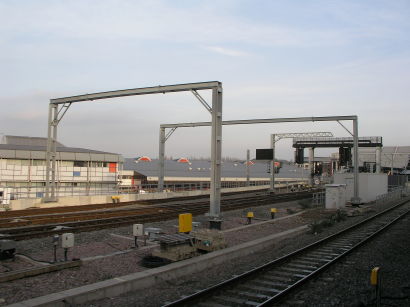ELECTRIFICATION of several routes was cancelled because it would have cost too much, and not to ‘avoid disruption’ as transport secretary Chris Grayling had claimed, according to a new report from the National Audit Office.
The report also concludes that the benefits claimed for bi mode trains on the Midland Main Line are uncertain, because rolling stock able to meet the requirements of a faster timetable without full electrification has yet to be designed or built.
The cancelled schemes examined by the NAO were Kettering to Nottingham, Derby and Sheffield, Oxenholme to Windermere and Cardiff to Swansea. The report describes electrification of the sections of the Great Western Main Line to Bristol Temple Meads and Oxford which has also been delayed as ‘pending’.
Concerns about the lack of sufficient funding in Network Rail’s budget for CP5 were followed by an internal decision in March last year to cancel the Midland Main Line scheme north of Kettering and also on the Windermere branch, but there was less certainty about the Swansea scheme. Theresa May wanted to see more details before taking a decision, but in July she agreed to cancel that as well.
This was followed by a written statement to Parliament on 20 July, just before the summer recess, by transport secretary Chris Grayling. He announced that all three schemes had been withdrawn from Network Rail’s electrification programme, saying that technology was ‘advancing quickly’, and that new types of power for trains were being developed.
He continued: “These new technologies mean that we can improve journeys for passengers on the Great Western Main Line in south Wales, the Midland Main Line, and on the Lakes Line between Windermere and Oxenholme sooner than expected with state of the art trains, instead of carrying out disruptive electrification works.”
A DfT press release issued on the same day reinforced this message, saying: ‘Passengers will benefit sooner and experience less disruption compared with putting up intrusive wires and masts along routes where they are no longer required.’
This was at odds with the business case for MML electrification in July 2012, which had said electrification would ‘reduce operating costs and environmental impact’.
The report also reveals that Network Rail presented a range of options for saving money in October 2016. A total of 23 schemes had been identified, including six in ‘Category 0’, which were considered to be the first choices for cancellation. These included the Midland Main Line and Windermere schemes.
The NAO comments: “Network Rail considered that it could replace some of the Category 0 electrification projects with cheaper alternatives that provided similar outcomes for passengers. It is not clear what the alternatives were.”
It concludes: “It is too early to tell the extent to which the Department will be able to deliver the benefits of electrification without electrifying the three routes. The Department still expects to deliver the majority of promised passenger benefits through planned infrastructure works and replacing existing trains … Although bi-mode trains allow greater flexibility by being able to run on electrified and non-electrified lines, there are some disadvantages, such as increased track damage and higher energy costs, which the Department will need to take into account.”
The revelations have triggered a new wave of protests about the cutbacks.
Swansea West MP Geraint Davies said Mrs May should answer to his constituents. He added: “It’s clear that she has intervened personally to break her predecessor’s promises. The people who are in the greatest need shouldn’t be paying the price of that incompetence and she should honour the word of the Conservative Prime Minister before her.”
ASLEF general secretary Mick Whelan has described the cutbacks as ‘indefensible’.
He continued: “We welcome the results of this investigation, because the decision to renege on this Conservative party pledge was as perverse and ridiculous as it was indefensible. This country needs a modern railway, and a proper infrastructure, fit for the 21st century.
“The truth is that the government didn’t want to find the money and made up a story about ‘sudden improvements’ using ‘state of the art bi-mode trains’. It’s a fantasy, an exercise in smoke and mirrors to disguise the truth, and Mr Grayling has been rumbled by the NAO.”
The Department for Transport said: “As this report makes clear, we are focused on delivering better trains and services to passengers more quickly, at better value for money for the taxpayer, without the significant disruption to services that electrification can cause.”


